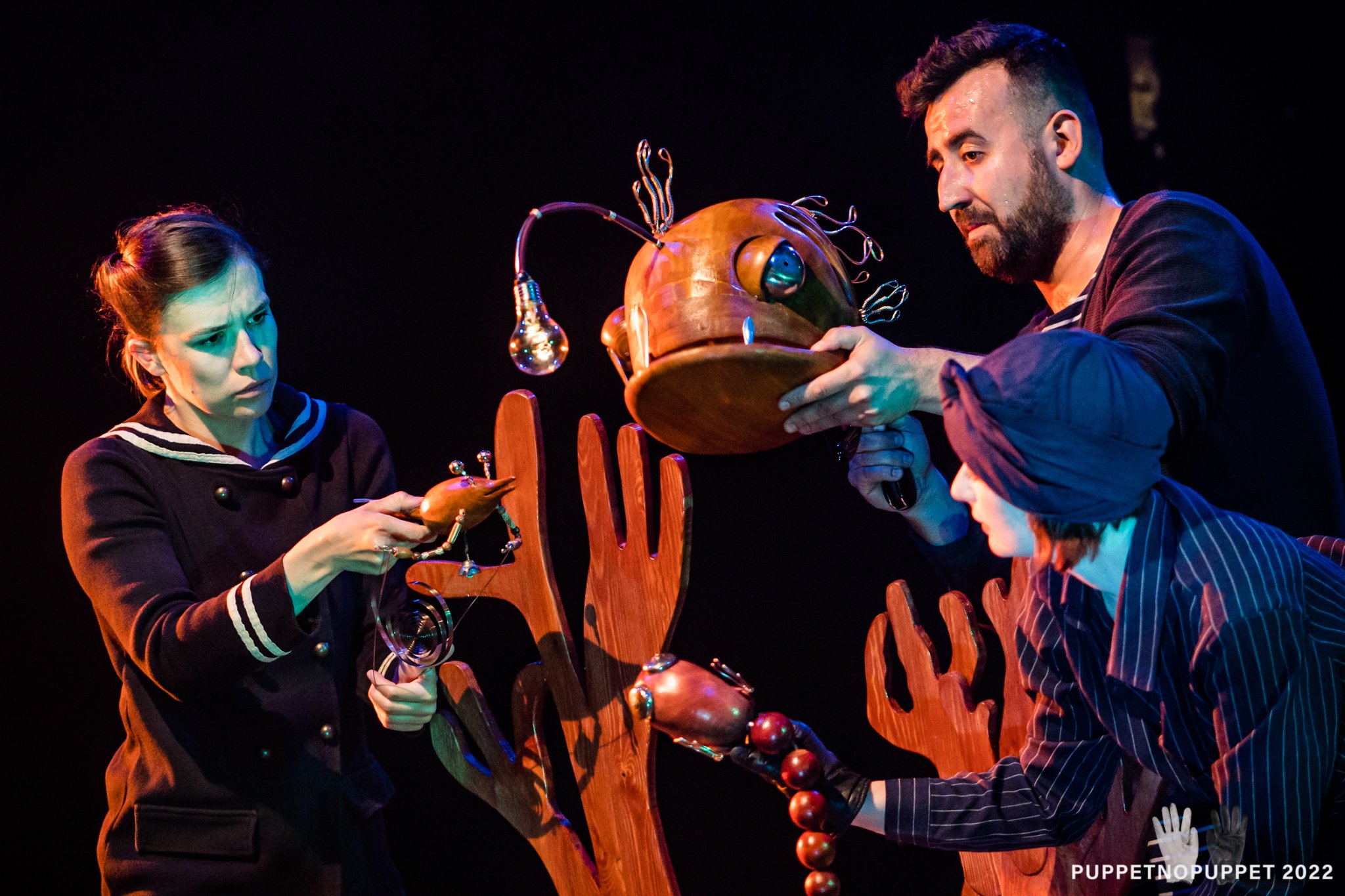the stage as an ocean
critical review of Biba Fish (Ryba Biba) by Teatr Fraktal (Poland). work presented during the 10th International Festival of Puppetry Schools PUPPETNOPUPPET (LALKANIELALKA) in Bialystok, Poland, on June 2022. this text is written by amilton de azevedo within the context of the Puppet Theater Criticism Workshop offered by the International Association of Theater Critics (IATC).
Puppeteering is probably the theater form that proposes cocreativity in the most direct way – not only the audience is invited to imagine impossible sceneries by completing the narrative presented on stage in their own minds, but they’re evoked into it. “Biba Fish” (”Ryba Biba”), from Polish group Teatr Fraktal, as a children-aimed puppet staging, keeps doing it constantly: spectators were introduced to deep sea creatures as they followed the tale of the title character and its friends.
From the synopsis and through the whole performance, it became crystal clear that beauty is a tricky human concept to launch and use when regarding nature. Considering the photographic and video registries of the universe which is the profound waters around the globe’s really unknown ocean floors and ecosystems, those bioluminescent animals – specially fishes – are usually considered uglys.
Throughout Biba’s trajectory, nevertheless some recognizable narrative tropes can be perceived, Teatr Frakta presents their audience with obvious yet meaningful metaphors within its narrative. As the unlikely friendship between the fish and the eel develops, the importance of one’s recognition of its own internal light as a guide through the path of life; as a movement of self discovery where the journey is so – or more – important than the destination.
As a non-polish speaker, it is important to point out that these understandings are fruit of the visual perception of the show’s puppeteering, which is also something to highlight. Whereas some puppets weren’t narratively important, considering there was not a real interaction of them with the central characters, their display, summed up with light designing and a really unusual soundscape, produced with unexpected instruments such as a theremin, played a major part in the act of seeing the stage as an ocean.
In Richard Linklater’s “Boyhood” (2014), there is this scene where the boy asks his father about the existence of magical creatures. Ethan Hawke’s character answers him with a new question: “Well, I don’t know, what makes you think that elves are any more magical than something like… like a whale?”. And he continues:
What if I told you a story about how underneath the ocean, there was this giant sea mammal that used sonar, and sang songs, and it was so big that its heart was the size of a car? And you could crawl through the arteries? I mean, you’d think that’s pretty magical, right?
Once one’s enabled – by an artwork or just a conscious change of perspective – to put aside conventions and a normalized view of the world, life itself becomes entirely magical. “Biba Fish” is about the possibility to resignificate concepts that have been banalised – from beauty standards to inner light as something you’d need a course to activate or achieve.
Fraktal’s play can sometimes incur onto a circular narrative that would ask for some refinement in the encenation dramaturgy – considering, also, that what appeared to be the first central conflict of the performance deserves a less anticlimactic resolution. However, the staging choices, mostly regarding set design, are powerful enough to sustain, through illusions, props and effects, the deep sea magic dreamlike atmosphere in precision-demanding movements that are carried on by the performers.
Regarding interpretation, it is beautiful to watch as the puppet animals’ characteristics are accompanied by facial and body expression of their puppeteers. Through Biba and its friends’ journey in the deep, Teatr Fraktal invites the children and adult spectators to think about all the different sources of luminescence that one can rely on amongst the experience of living in a plural society. The disco globe spreading its shiny reflections all over the audience leaves no doubt: there is more than enough lighting for all of us to follow our paths.
[be a supporter of amilton de azevedo’s critical production: meet the continuous crowdfunding campaign keeping the ruin alight!]

